Tunisian Children Pay for Jihadist Parents’ Sins
About 200, most with their mothers, are locked in squalid camps and prisons in other countries, but Tunisia has refused to take them in.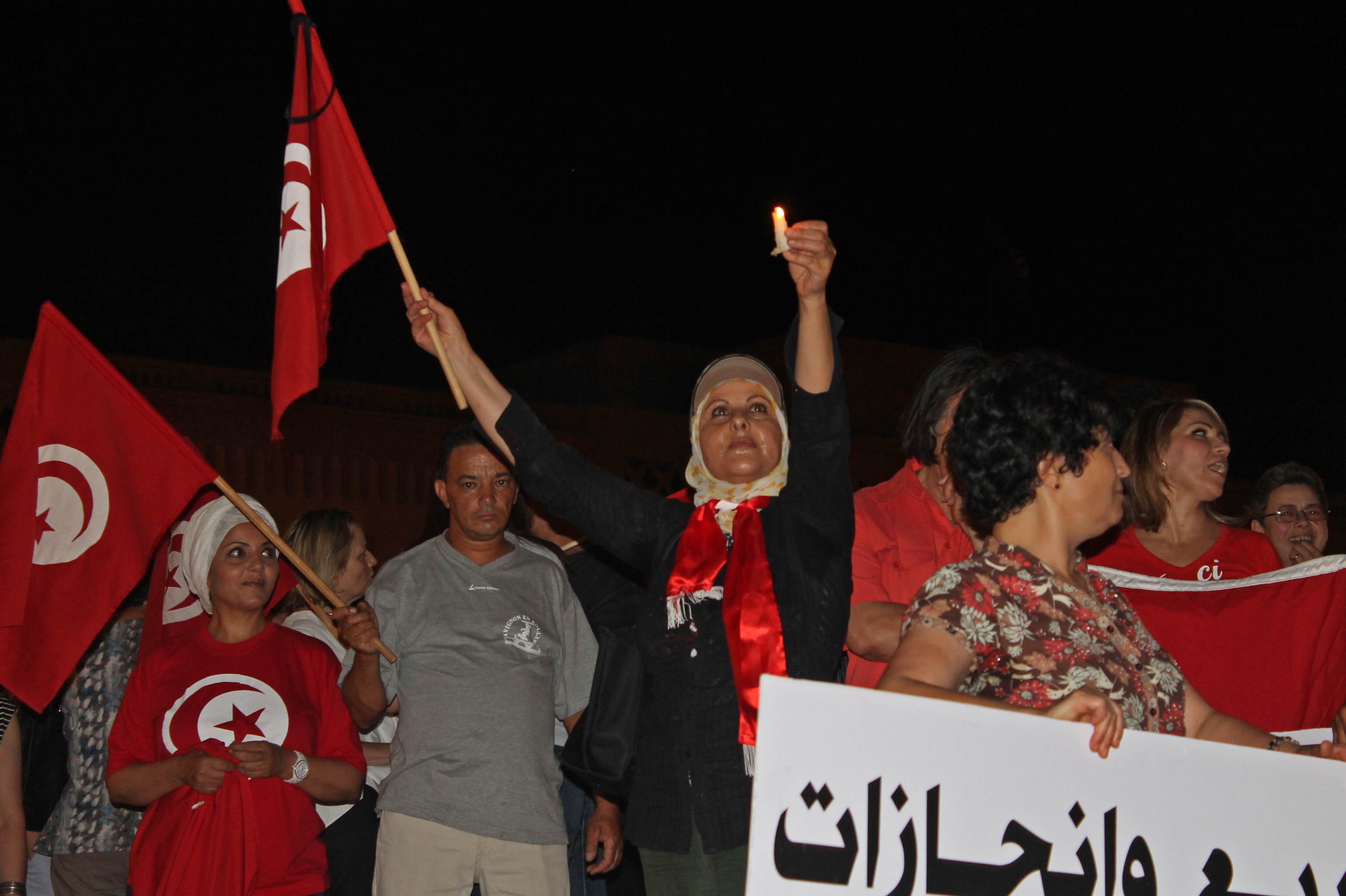 Tunisians gather at an anti-terrorism protest. Many oppose repatriating IS families, and the country doesn't have a structure in place to rehabilitate radicals once they return. (Wikimedia Commons)
Tunisians gather at an anti-terrorism protest. Many oppose repatriating IS families, and the country doesn't have a structure in place to rehabilitate radicals once they return. (Wikimedia Commons)
Truthdig is proud to present this article as part of its Global Voices: Truthdig Women Reporting, a series from a network of female correspondents around the world who are dedicated to pursuing truth within their countries and elsewhere.
TUNIS, TUNISIA — “I lost them forever. I can’t get my grandchildren back from Syria.”
Tahia Sboui cries as she talks about her son’s children living in a Syrian camp after their father, a Tunisian Islamic State (IS) fighter, was killed. He had been fighting in Boukamal, a city in eastern Syria.
Sboui, who lives in Kairouan in central Tunisia, tells the distressing story of how she fought for months to bring her grandchildren home but ultimately lost contact with them.
Sboui’s grandchildren are among the estimated 200 Tunisian children and 100 Tunisian women detained in refugee camps and prisons in Libya, Syria and Iraq, according to Human Rights Watch (HRW). A recent HRW report says these IS family members are being held in squalid—and sometimes violent—conditions and that “Tunisia officials have been dragging their feet on helping bring [them] home.”
The Tunisian women and children are part of a larger problem that began in 2016 as IS started to suffer military defeats in the region. Currently, an estimated 2,000 children and 1,000 women from 46 nations are detained in Iraqi and Libyan prisons and in Syrian camps. Repatriating these detainees has been painfully slow—hampered by fear of terrorism at home and by a complex web of international relations.
Pleading Over the Phone
A year ago, Sboui received a phone call. At the other end of the line was a young woman speaking in a Syrian dialect. The woman told Sboui that she was the first wife of Sboui’s son, Awas, and that she was with his five children in a camp in northern Syria. Three of the children were hers; the two others were the children of Awas’ now-deceased second wife, a Tunisian. (Awas had two wives at the same time.) The 18-year-old Syrian woman pleaded for Sboui’s help to move to Tunisia with the children, ages 7 months to 4 years (pictured below).
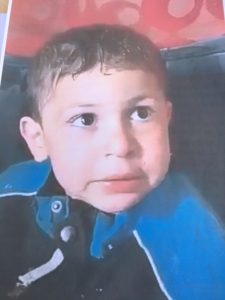




Awas had left Tunisia in 2012 to fight in Syria, and Sboui was surprised to learn he had married two women and had five children. The call began a long struggle as she tried to get Tunisian authorities to repatriate the youngsters. She made contact with the Tunisian Ministry of Foreign Affairs, but it didn’t provide help.
Her other son went to Turkey to ask for help at the Tunisian Consulate in Istanbul. The consulate said it could not enter Syrian territories and that he had to arrange for the children and the woman to enter Turkey. Awas’ brother sent money to his sister-in-law to pay smugglers to bring her to the Turkish border, but when the woman and children arrived there, Turkish authorities sent them back to the camp in Syria.
In the meantime, one of the five children died in the camp. (Sboui says her grandchild was malnourished and suffered from disease, but she doesn’t know what caused the death.)
The grandmother blames the Tunisian authorities for not cooperating. “We told the Ministry of Foreign Affairs that we [the father’s family in Tunisia] … welcome them and [will] take care of them, but it refused to help us,” she says.
Sboui is very angry. In 2012, she had warned government authorities that her son was leaving Tunisia to join IS in Syria (via Libya), and she is upset they didn’t stop him at the Libyan border. “My son was killed with his second wife” in the Boukamel fighting, she says. “I’m the only family that remains to those children, [their only chance] to live in a safe place.”
Moncef Abidi, who lives in Kef in northwestern Tunisia, also is trying to bring home relatives following IS defeats. His sister Wahida and his 4-year-old nephew Baraa are imprisoned in Mitiga Prison in Tripoli, the capital of Libya. The prison is under the control of the Special Deterrence Force, a radical Islamist militia organization. “The last call that I got from my sister was three months ago,” Abidi says. “She was asking me to help her to come back with her sick child, even if she will be imprisoned in Tunisia.”
In 2012, Wahida’s husband took her to live in Libya, and he joined IS two years later. According to Abidi, his sister didn’t know her husband was an IS fighter, and when she discovered it and wanted to go back to Tunisia, he “threatened to take away their son.”
In 2016, Wahida, her husband and other IS fighters were running away from an armed confrontation and were caught in a U.S. raid. Wahida’s husband was killed, and she and Baraa were hurt. The boy’s injuries were especially severe—a bullet entered his back and exited through his stomach.
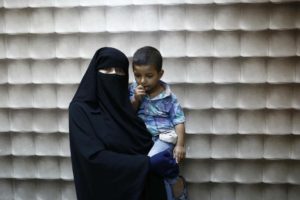
The Special Deterrence Force moved Wahida to Mitiga, where she was imprisoned with 14 other IS women and 22 of their children, says Mohamed Ikbal Ben Rejab, president of the Rescue Association of Tunisians Trapped Abroad (RATTA). This nongovernmental organization works to help Tunisian citizens abroad and repatriate them into Tunisian society.
Baraa spent four months in a hospital and underwent five surgeries. The boy needs additional medical care that isn’t available in Libya. “His situation is critical,” Abidi says. “It’s unacceptable to let him [remain] in prison.”
Problems With Repatriation
Some countries are moving forward to repatriate IS family members—Russia, Kazakhstan, Uzbekistan, Indonesia, Egypt and Sudan have made the most progress, according to HRW. Other countries, from the U.S. to Tunisia, have done very little.
Tunisia has had one of the highest rates of nationals going to Syria, Iraq and Libya to join terrorist groups. From 2011 to 2013, Ennahdha, the Muslim Brotherhood party that held power in Tunisia, facilitated the process of sending fighters through Libya and Turkey to Syria. Tunisian authorities estimate the country’s number of jihadists at 3,000, but other sources report more than 6,000, including 1000 women.
After IS defeats in Syria and Libya, some Tunisian fighters and family members started to return home. Some came back on their own, while Turkish authorities handed over others to Tunisian authorities. Most of the fighters are in prison or under police supervision. Officially, the number is 800, but it could be higher because all of them haven’t been declared to the Tunisian authorities. Among them, 25 women and 30 children came back from Syria, according to a source in Tunisia’s Ministry of the Interior. (The source spoke to this reporter but asked to remain anonymous.)
Since 2017, Libyan authorities have put pressure on Tunisia to repatriate the women and children imprisoned in Libya, but the two countries haven’t reached an agreement, according to Ikbal. He says Tunisian authorities want to allow children back without their mothers, while the Libyan government wants Tunisia to take back all its citizens—and even 80 corpses of Tunisian IS fighters. (Other countries have recently made moves to repatriate children while leaving their mothers behind.)
For its part, the Tunisian government is reluctant to repatriate IS women for fear of social disruption at home. “We are afraid that they will bring terrorist ideas with them,” says the source at the Interior Ministry.
That source adds that Tunisia doesn’t have a structure in place to rehabilitate radicals once they return.
In 2014, Moncef Marzouki, then the president of Tunisia, suggested rehabilitating some returnees, but the idea was abandoned due to social opposition. Popular sentiment at the time held that the jihadists were dangerous and should be imprisoned. Government action—plus a community support system—is essential for a rehabilitation plan to succeed, according to the Carnegie Endowment for International Peace. However, it’s not clear whether the public would support that kind of effort at present.
Khaoula Ben Aicha, a member of Tunisia’s legislature, is actively involved in the move to repatriate Tunisian IS children. She gives another explanation of the impasse between Libya and Tunisia, one based on international politics. “Tunisian authorities don’t want to deal with Libyan militias [such as the Special Deterrence Force] that are imprisoning children, because it will be considered as a form of recognition to them,” she says. But “children [should] not continue to pay for this situation.”
The political situation with Syria is complex, as well. Like many countries, Tunisia doesn’t have official relations with the Syrian government, and the camps housing IS families are controlled by Kurdish authorities—not by a formally recognized government.
Pressure Leads to Some Action
Under pressure from Libyan authorities and concerned Tunisian citizens, the Tunisian government has sent three delegations to Libya since April 2017. Negotiations resulted in the repatriation of Tamime, a 4-year-old orphan, in October 2017 and two other children at the end of 2018.
Tunisian authorities acted in these cases after major efforts on the part of the children’s families.
Tamime’s grandfather, Fawzi Trablesi, went to Libya four times and engaged in direct negotiations with representatives of the Special Deterrence Force. “It was difficult to repatriate him,” Trablesi says. “But now he’s here, and I’m very happy that he will be raised in Tunisia within his family.”
In the case of the two other children—siblings ages 7 and 10—their family hired a Libyan lawyer to negotiate with Libyan authorities.
Last January, another delegation went to Libya to take the DNA of six orphans who had been cared for by the Libyan Red Crescent since December 2016. The DNA tests established that the children were Tunisian. By law, a child born to a Tunisian mother in another country is a Tunisian citizen.
According to the recent HRW report, international law dictates that everyone “has the right to a nationality,” and the document adds that the “Tunisian Constitution prohibits denying or revoking citizenship or preventing citizens from returning home.” However, HRW points out that the Tunisian women and children detained in other countries are unable to return home without help from their government.
Libya and Tunisia agreed that the orphans would be transferred to Tunisia in February, but the transfer hasn’t taken place yet. Tunisian authorities acted because the Libyan Red Crescent warned them it could no longer take care of the children.
“It was a good initiative [by] Tunisian authorities, but it is not enough,” Ikbal says. “It is necessary to repatriate all the Tunisian children abroad.” RATTA, one of the few groups working on this issue, has stepped up activities since 2017. Its efforts to pressure the Tunisian government range from press conferences to sit-ins.
Human rights activists feel Tunisian IS children and mothers should be repatriated together, even if the mothers are imprisoned when they return home. “Legitimate security concerns are no license for governments to abandon young children and other nationals held without charge in squalid camps and prisons abroad,” according to Letta Tayler, senior HRW researcher on terrorism and counterterrorism. Quoted in the organization’s report last month, Tayler added: “Tunisian children are stuck in these camps with no education, no future, and no way out while their government seems to barely lift a finger to help them.”
Sboui, the grandmother who tried to bring her son’s children back to Tunisia last year, has no hope of seeing them again. Her former daughter-in-law has remarried and cut off communication with her former husband’s family.
“For me, I lost them forever,” Sboui says.
Your support is crucial...As we navigate an uncertain 2025, with a new administration questioning press freedoms, the risks are clear: our ability to report freely is under threat.
Your tax-deductible donation enables us to dig deeper, delivering fearless investigative reporting and analysis that exposes the reality beneath the headlines — without compromise.
Now is the time to take action. Stand with our courageous journalists. Donate today to protect a free press, uphold democracy and uncover the stories that need to be told.



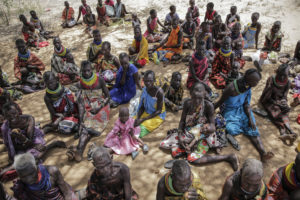

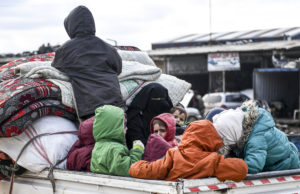
You need to be a supporter to comment.
There are currently no responses to this article.
Be the first to respond.